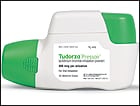FDA approves Aclidinium (Tudorza Pressair), a b.i.d. "me-too" to Spiriva for COPD

July 29, 2012
Last week, the FDA approved aclidinium bromide (Tudorza Pressair) as a daily inhaler treatment for chronic obstructive pulmonary disease (COPD), the agency announced in a press release. Aclidinium is a long-acting muscarinic antagonist (or "anticholinergic") bronchodilator that will compete with tiotropium (Spiriva), which was launched in 2004 and until now was the only available anticholinergic bronchodilator inhaler therapy for COPD.
Aclidinium bromide will be marketed as Tudorza Pressair by Forest Pharmaceuticals, a subsidiary of Forest Laboratories. Aclidinium was simultaneously approved in Europe, where it was co-developed by Spain's leading drugmaker, Almirall.
Aclidinium is a dry powder inhaler used twice daily; the FDA approved aclidinium in a 400 mcg b.i.d dose. In three efficacy trials (n=1,276), aclidinium improved baseline morning trough FEV1 by about 75-120 mL in people with stable, moderate-to-severe COPD, compared to placebo. Aclidinium performed comparably to tiotropium when a tiotropium arm was tested.
Why would someone prescribe, or use, a b.i.d. product like aclidinium when a once-daily product (tiotropium) is available, efficacious, and generally safe? The sales strategy will likely rest on pharmacology: aclidinium reaches therapeutic levels within 2 days, compared to more than a week for tiotropium, and in this study by Fuhr in Chest, aclidinium resulted in higher nighttime FEV1s and also lower COPD symptom scores, compared to tiotropium.
The FDA's advisory committee had already voted 12-2 in February to recommend approval of aclidinium. However, that committee also called for postmarketing studies to determine the risk of any potential cardiovascular side effects caused by aclidinium.
Spiriva / tiotropium was suspected of causing cardiovascular side effects based on observational trials, but a close examination of randomized trial data (mainly from the UPLIFT trial) largely exonerated the drug in the FDA's view, which pronounced it safe cardiovascular-wise.
As for aclidinium's cardiovascular risks, investigators concluded that major cardiac adverse events occurred in 0.3% of patients in patients taking aclidinium, vs 0.6% of patients on placebo overall. Over longer periods of observation (in a safety study), 2.1% of patients taking 400-mcg had major cardiac adverse events.
However, of the 2 cardiovascular deaths in the placebo-controlled trials, both were among patients taking aclidinium (none in the placebo group), a finding that while not statistically significant, was concerning to some committee members.
Drawing any conclusions from that possibly chance finding was made even more difficult by the fact that many patients continued to smoke during the trials.
Aclidinium (Tudorza Pressair) will be available in the U.S. in the 4th quarter of 2012, news reports say, and analysts predict it could become a $200 million drug within a few years. Spiriva, marketed by Boehringer-Ingelheim, generated about $2.5 billion in sales in 2011.
MedPage Today and InPharm News: Aclidinium approved
Aclidinium ATTAIN study (ERJ ePub)
Fuhr R et al. Efficacy of Aclidinium Bromide 400 μg Twice Daily Compared With Placebo and Tiotropium in Patients With Moderate to Severe COPD. Chest 2012;141:745-752.


